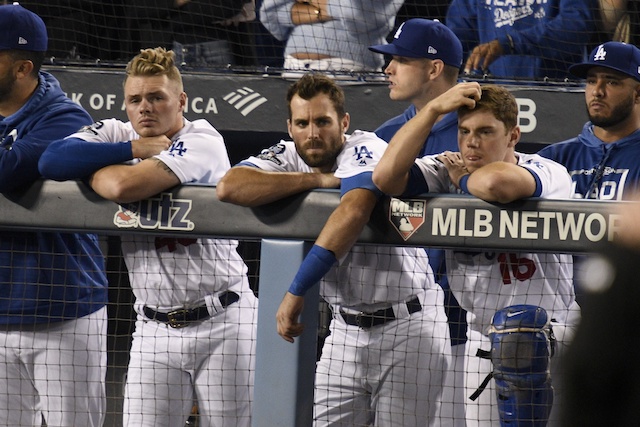The Los Angeles Dodgers’ magical 2019 season came to an unexpected end with their 7-3 loss to the Washington Nationals in Game 5 of the National League Division Series, making it the earliest they’ve been eliminated from the postseason since 2015.
The Dodgers felt confident entering the matchup and liked their chances of advancing to a fourth consecutive NL Championship Series. Not only would the decisive Game 5 be settled at Dodger Stadium where they posted a 59-22 record during the regular season, but Walker Buehler additionally took the mound with a postseason scoreless innings streak of 16.2 under his belt.
Playing to their obvious advantages, the Dodgers jumped out to a good start against Stephen Strasburg, putting three runs on the scoreboard over the first two innings of play. Max Muncy provided early run support with a two-run homer in the first before Kiké Hernandez added a solo shot of his own one inning later.
The Nationals were kept scoreless until the sixth when Juan Soto broke through with an RBI single against Buehler, snapping his scoreless streak at 21.2. It was the only run he would allow in 12.2 innings of work across two starts this postseason.
The rest was history, as the Nationals mounted an unprecedented comeback despite being just six outs away from elimination. Anthony Rendon and Soto allowed Washington to even up the score with back-to-back home runs against Clayton Kershaw in the eighth before Howie Kendrick solidified the victory with a grand slam off Joe Kelly two innings later.
Dodgers manager Dave Roberts has received the brunt of the criticism for the loss, based on his many questionable decisions, whether it was letting Kershaw pitch in the eighth inning or extending Joe Kelly’s outing to the 10th.
Kershaw, despite throwing just six pitches, pinned the Dodgers’ loss squarely on his shoulders. Though, many of teammates disagreed and came to his defense.
Other factors additionally played a significant role in the Dodgers’ stunning defeat. For one, the club received little-to-no offensive production from many of their key players.
Cody Bellinger, after enjoying one of the best regular seasons in franchise history, hit just .211/.286/.263 during the five-game series. He recorded only four hits in 19 at-bats, doubling once while failing to tack on to his 47 home runs prior to the postseason.
Corey Seager also struggled to the tune of a .150/.190/.200 batting line in 20 at-bats. Like Bellinger, he was unable to provide much power and accumulated only one extra-base during the series.
Similarly, A.J. Pollock couldn’t capitalize on a productive month of September. He did not record a hit in 13 at-bats and struck out 11 times to boot. As a result, Pollock was eventually supplanted by Matt Beaty in the starting lineup for Games 4 and 5, who made the most of his playing time by recording three hits over eight plate appearances.
Individual struggles aside, the Dodgers also failed as a team to cash in with runners in scoring position. During those situations, the club tallied only five hits in 37 opportunities (.135).
That was especially a disappointment considering the Dodgers were one of the most efficient teams with runners in scoring position during the regular season. The club led the NL in batting average (.286) and on-base percentage (.374) while finishing second to only the Nationals in on-base plus slugging (.872).
Washington, on the flip side, recorded eight hits in 35 at-bats with runners in scoring position (.229). Their big bats in Rendon (1.219 OPS) and Soto (1.020 OPS) also produced when it mattered most.

